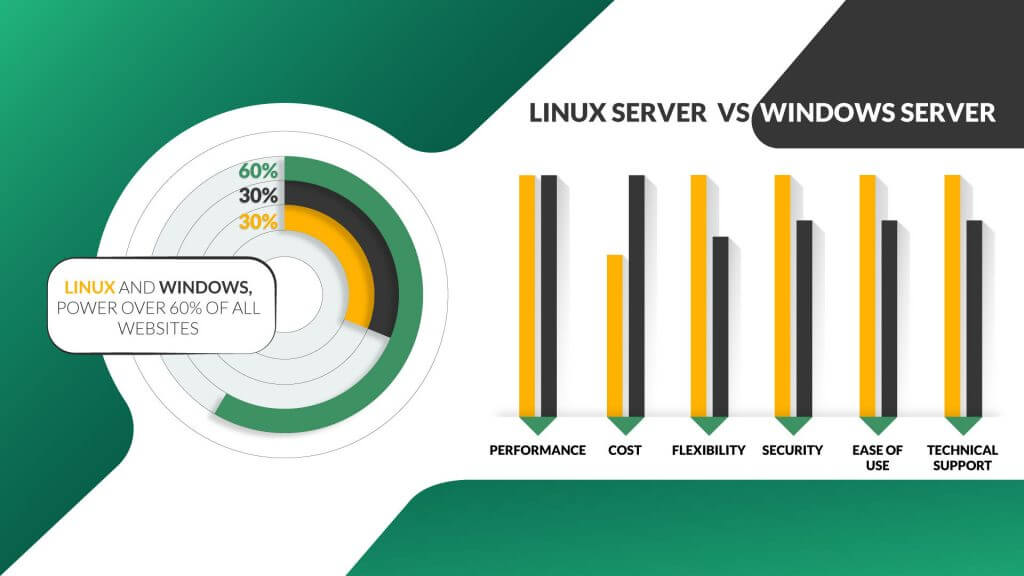How Linux VPS is better than Windows VPS?
Finding the best VPS Operating System (OS) is important for two reasons. One, it’s the basic interface through which you’ll be interacting with the server and both OS have very different approaches to server operating systems.
Secondly, your OS will, for the most part, decide how your website works. Each operating system uses different and sometimes exclusive software and applications to power a server, meaning that your choice of applications will always be decided by the operating system that you choose.
The choice between a Linux Virtual Private Server (VPS) and a Windows VPS depends on various factors, including your specific requirements, familiarity with operating systems, and the applications you intend to run.
How Linux VPS is better than Windows VPS – Here are some reasons why Linux VPS is often considered better than Windows VPS in certain scenarios.
How Linux VPS is better than Windows VPS – How to choose the best OS for your VPS Server?
There are two players in the market when it comes to server operating systems — Linux and Windows.
Linux is an open-source operating system that’s free to use for anyone. However, you’re going to need extensive expertise in Linux if you want to use some Linux distro right out of the box. Chances are, you’re going to have to spend on customizing your Linux so that you can use it easily.
Windows server operating system, on the other hand, is pretty similar to a PC Windows OS, meaning that there’s a good chance that you know how to use the operating system right out of the box. However, Windows server OS isn’t free.
Additionally, it’s important to understand right at the beginning that there’s no ‘better’ option here. Both Windows and Linux, have their fair share of advantages and disadvantages. The best operating system for you is the one that fits your needs better than the other one.
This article takes a look at some key features of both the operating systems and explores what markets they’re each catering to.
1. Cost:
- Linux is open-source, which means you don’t need to pay licensing fees for the operating system. Many Linux distributions, such as Ubuntu, CentOS, and Debian, are freely available. This can significantly reduce the overall cost of hosting a Linux VPS compared to a Windows VPS.
2. Resource Efficiency:
- Linux generally has lower resource requirements than Windows, allowing you to allocate more resources to your applications and services. This efficiency can be crucial, especially on VPS plans with limited resources.
3. Performance:
- Linux is often considered more lightweight and performs well on a wide range of hardware. This can result in better overall performance, faster boot times, and lower system overhead compared to Windows.
4. Flexibility and Customization:
- Linux provides a high level of flexibility and customization. Users have extensive control over the operating system, allowing them to configure and optimize it according to their specific needs. This is especially beneficial for experienced users and system administrators.
5. Command Line Interface (CLI):
- Linux offers a powerful command-line interface (CLI), providing administrators with a robust set of tools to manage the system efficiently. For users comfortable with the command line,

6. Security:
- Linux is known for its strong security features. It has a robust permission system, a well-defined user model, and a central repository for software updates. Additionally, the open-source nature of Linux allows for rapid security updates and community scrutiny.
7. Server Management:
- Many server management tools and control panels are designed with Linux in mind. Popular solutions like cPanel and Plesk often have better integration and support for Linux, making it easier to manage your server.
8. Community and Documentation:
- Linux has a vast and active community of users and developers. This results in extensive documentation, forums, and online resources, making it easier to find solutions to common issues and get assistance when needed.
9. Containerization and Virtualization:
- Linux has strong support for containerization technologies like Docker and virtualization solutions like KVM. This makes it well-suited for modern application deployment and management strategies.
10. Compatibility and Software Availability:
It’s important to note that the choice between Linux and Windows VPS ultimately depends on your specific needs and the applications you plan to run. Some applications, especially those developed for Microsoft technologies, may require a Windows environment. Always consider the specific requirements of your project before making a decision.

